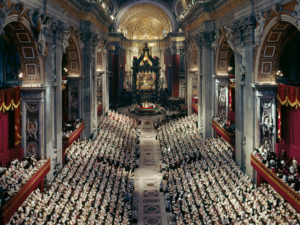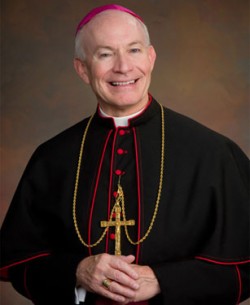Podcast: Play in new window | Download (Duration: 32:21 — 22.3MB) | Embed
Subscribe: Apple Podcasts | Spotify | Amazon Music | Android | Pandora | iHeartRadio | JioSaavn | Podchaser | Gaana | Podcast Index | Email | TuneIn | Deezer | Anghami | RSS | More

Episode 20 Vatican II – Dei Verbum pt. 1 – Why it Matters: An Exploration of Faith with Archbishop George Lucas
In this episode with Archbishop Lucas, we begin our conversation on the Dogmatic Constitution on Divine Revelation
Dei verbum, the Second Vatican Council’s Dogmatic Constitution on Divine Revelation, was promulgated by Pope Paul VI on 18 November 1965, following approval by the assembled bishops by a vote of 2,344 to 6. The phrase “Dei verbum” is Latin for “Word of God” and is taken from the first line of the document, as is customary for titles of major Catholic documents.
An excerpt from Dei Verbum:
10. Sacred tradition and Sacred Scripture form one sacred deposit of the word of God, committed to the Church. Holding fast to this deposit the entire holy people united with their shepherds remain always steadfast in the teaching of the Apostles, in the common life, in the breaking of the bread and in prayers (see Acts 2, 42, Greek text), so that holding to, practicing and professing the heritage of the faith, it becomes on the part of the bishops and faithful a single common effort. (7)
But the task of authentically interpreting the word of God, whether written or handed on, (8) has been entrusted exclusively to the living teaching office of the Church, (9) whose authority is exercised in the name of Jesus Christ. This teaching office is not above the word of God, but serves it, teaching only what has been handed on, listening to it devoutly, guarding it scrupulously and explaining it faithfully in accord with a divine commission and with the help of the Holy Spirit, it draws from this one deposit of faith everything which it presents for belief as divinely revealed.
It is clear, therefore, that sacred tradition, Sacred Scripture and the teaching authority of the Church, in accord with God’s most wise design, are so linked and joined together that one cannot stand without the others, and that all together and each in its own way under the action of the one Holy Spirit contribute effectively to the salvation of souls.
Also:
11. Those divinely revealed realities which are contained and presented in Sacred Scripture have been committed to writing under the inspiration of the Holy Spirit. For holy mother Church, relying on the belief of the Apostles (see John 20:31; 2 Tim. 3:16; 2 Peter 1:19-20, 3:15-16), holds that the books of both the Old and New Testaments in their entirety, with all their parts, are sacred and canonical because written under the inspiration of the Holy Spirit, they have God as their author and have been handed on as such to the Church herself.(1) In composing the sacred books, God chose men and while employed by Him (2) they made use of their powers and abilities, so that with Him acting in them and through them, (3) they, as true authors, consigned to writing everything and only those things which He wanted. (4)
Therefore, since everything asserted by the inspired authors or sacred writers must be held to be asserted by the Holy Spirit, it follows that the books of Scripture must be acknowledged as teaching solidly, faithfully and without error that truth which God wanted put into sacred writings (5) for the sake of salvation. Therefore “all Scripture is divinely inspired and has its use for teaching the truth and refuting error, for reformation of manners and discipline in right living, so that the man who belongs to God may be efficient and equipped for good work of every kind” (2 Tim. 3:16-17, Greek text).

For the documents of Vatican II visit here
For more episodes in this series visit the


